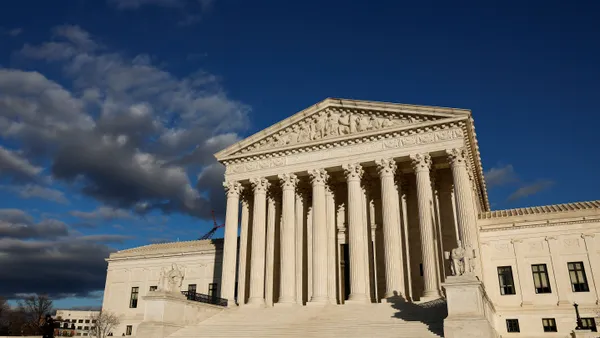Dive Brief:
- Two Shamrock Foods employees failed to show they were confused by background check information and would not have signed off had it contained a sufficiently clear disclosure, the 9th U.S. Circuit Court of Appeals concluded (Ruiz v. Shamrock Foods Co., No. 18-56209 (9th Cir., March 20, 2020)).
- The employees alleged in a putative class action lawsuit that the employer violated the Fair Credit Reporting Act (FCRA) by failing to obtain authorization for the check and properly disclose its intent to obtain consumer reports. The information was included in a "lengthy" employment application, they alleged, adding that references to state law and the inclusion of a liability waiver made the FCRA forms confusing. A district court granted summary judgment for the employer.
- On appeal, the 9th Circuit affirmed the lower court's ruling, finding that the plaintiffs did not demonstrate confusion and failed to show they wouldn't have signed the form if it had contained a clear disclosure. One judge, however, disagreed with the majority. In a dissent, N. Randy Smith said the lower court’s dismissal should be reversed because when a job applicant is not aware that he or she is authorizing an employer to obtain a consumer report in instances where the employer did not provide a clear and conspicuous disclosure, the job applicant is deprived of his or her right to information and privacy protected by the FCRA.
Dive Insight:
The FCRA requires that an employer take certain steps before obtaining a consumer report, and before and after it takes an adverse action based on that report, according to the Federal Trade Commission.
Employers tend to make two mistakes when it comes to FCRA compliance, Matthew Simpson, a partner with Fisher Phillips, previously told HR Dive. He said employers often include extraneous language in the form that notifies employees of the background check and also take adverse employment actions before providing the applicant with a copy of the report and an explanation of rights.
The 9th Circuit recently concluded that a grocer included too much information in a background disclosure, allowing the lawsuit to move forward. It also remanded part of the claim for the district court to determine whether some of the language in the disclosure satisfied the law's "clear and conspicuous" requirement. Separately, Frito-Lay paid $2.4 million to settle allegations that it violated the FCRA by including the disclosure in a document that also included "impermissible extraneous information."
To avoid such lawsuits and legal settlements, experts previously told HR Dive employers should follow four steps in creating an FCRA-compliant process. Applicants or employees must be notified of the background check; the employer must obtain the employee’s or applicant’s written permission; the applicant must be provided with a copy of the report and a summary of rights if a decision is made not to hire the applicant as a result of the background check; and all recordkeeping requirements relating to document retention and destruction should be satisfied.
State and local laws should also be considered as many have "mini-FCRAs," Simpson said.












